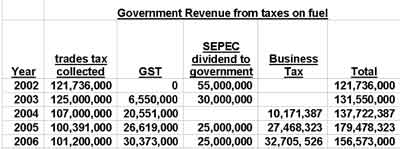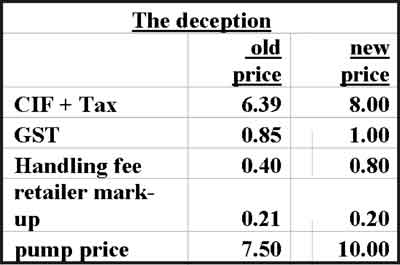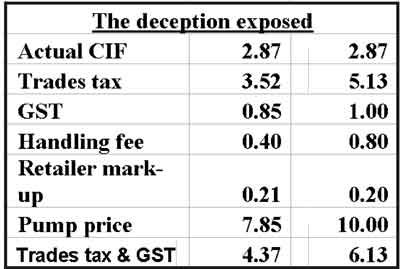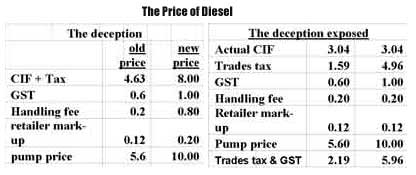

The Minister of Finance, Mr Danny Faure, went on television last Sunday evening to announce that the Government had decided to put up the price of petrol and diesel. The announcement surprised no one since rumours had been rife during the week. Last week this newspaper warned that it would happen after Faure had gone on television to announce that his Ministry too is restructuring.
Last week we also said that the government would increase the price of fuel sold at the petrol stations in order to raise more revenue and for no other reason. What we did not expect was that President Michel would send one of his Ministers on television to deceive and to lie to the people of
In his short but somewhat incoherent and self-serving statement last Sunday night, Faure said “It is true that during the Gulf War the government found it necessary to increase the price of fuel and again with the introduction of GST in 2003.” This is the first time that the government had made such an admission. But the following sentence “But during all these years with the increase in consumption of fuel, it is true that government also benefited from the revenue it collected which has gone into the state coffers, which have been distributed in the economy”, is an admission that the increased cost of importation was not the real reason for the increase. It was just an excuse.
This time, Faure is the one who has been tasked with making the grand deception once again. Here is what Faure said last Sunday evening on television. “We would like that the government does not lose the amount of money that it is losing today. And we would like to make sure that with the price of fuel that continues to go up in the international market, here in
Last week we revealed that Government generated over SR186,000,000 in revenue during the fiscal year of 2006 on the sale of fuel according to figures which Minister Faure gave to the National Assembly on the presentation of budget in December last year. Then the government had anticipated that SEPEC would pay SR 50,000,000 in dividends to Government. Instead SEPEC paid government only half that, although it made a reported gross profit of SR 269,872,588 in the year 2006. Still the government finished the year with SR156, 573,000 of revenue from taxes on fuel alone, the highest after 2005.

Statistics also show that, in the last seven months of this year, government has collected an estimated SR 42,000,000 in the form of trades’ tax on petrol alone. What many are asking is why the Government had to resort to lying in order to justify the increase in the prices of fuel?
The great lie of the Government is contained in the statement by Ahmed Afif, the Principal Secretary of Finance. Mr Afif, who followed the Minister on television, claimed that until last Sunday night the CIF (Cost, Insurance and Freight) cost of importing petrol together with trades’ tax came to SR6.39. Mr Afif chose, however, not to tell us exactly how much the CIF cost and the trades’ tax was on each litre of petrol separately. This newspaper has collected the most up-to-date statistics on the importation of fuel. What we found was that if Government and the Ministry of Finance had published those figures it would have been difficult for them to justify the increase on the ground they were “losing”. Instead, the Government chose to resort to an outright lie to cover up their true intension.


Statistics show that the CIF cost of one litre of petrol that SEPEC declared to Customs last year averaged to SR 2.87. That cost was even lower than for 2005, which was SR3.62. When offset against Afif’s figures, it showed that the trades’ tax on petrol alone was SR3.50. What we have also found is that when trades’ tax is added together with GST government was taking in SR4.37 on every litre of petrol consumed. This means that taxes alone account for 56% of the price of petrol when it was SR7.85. On the new price of SR10 a litre, it is SR6.13 on every litre of petrol consumed. In other words, Government is now taxing petrol at 61% of the pump price of ten rupees.

The decision to increase the price of diesel to SR10 has baffled many. Traditionally, diesel was always cheaper than petrol. To be fair, according to Customs declaration by SEPEC, the CIF cost of a litre of diesel averaged SR3.04 in 2006, up from SR0.99 cents in 2002. For the first time the cost of diesel had overtaken that of petrol. Despite this, last year Government was earning SR2.19 on each litre of diesel sold at the petrol stations in form of trades tax and GST. Under the new price of SR10 government would be getting SR5.56 on every litre consumed.
In his introductory statement last Sunday evening on SBC television, Minister Faure admitted that Government had never changed the price of fuel ever since the Gulf War in 1990 when it was raised it. The reasons given then was that the international price of oil had risen to S$50 a barrel. Yet, the war lasted barely one month, and soon after the price of oil dropped to as low as US$18 and never increased to more than US$28 a barrel until recently. Meanwhile, throughout these years consumers in Seychelles had been paying fuel as if the Gulf War was still going on.
What was as scandalous in the whole exercise was the treatment meted on the petrol station concessionaires. This was the other deceit of the Government in the current exercise. Under the new price structure, the petrol station concessionaires will now earn a smaller margin of profit while SEPEC’s profit margin will double. Even though SEPEC owns the petrol station, concessionaires have to have sufficient capital to cover the running costs of keeping the petrol stations open and shoulder all the risks pertaining to selling fuel. These costs are virtually constant. Now they are being once again sacrificed by the Government to provide SEPEC with more money still. Unless consumption increases, the concessionaires will be the loser. Danny said that the Government wants the people of
Last year, the government authorised a salary increase of SR32,273 for Captain Adam, the Chairman of SEPEC, raising his salary from SR415,790 to SR448,263. Adam’s post as Chairman of SEPEC was never advertised nor has the Government found it appropriate to appoint an independent member of the public to the Board of SEPEC. All the other board members are civil servants. Adam has substantial private businesses, including ownership of two small tankers that used to carry fuel to
Although SEPEC had cut back on the dividend it should have paid to the government in 2006, it also paid SR 7,653,304 to the German Development Bank (KFW) as interest on loans it took to build the celebrated tankers. In fact, SEPEC had been paying interest on the loans for the past three years even though we had been told that the tankers were making money and would be bringing a lot of foreign exchange. So far, the tankers had contributed zero dollars to SEPEC’s revenues, while SEPEC is forking out over one million dollars a year for the last three years to pay interests on the money it borrowed to build the tankers.
In his statement on television, Minister Danny Faure said that from now on the price of fuel will be revised every three months to reflect the actual CIF costs. Faure also said that he has created a section in the Ministry of Finance to announce the changes to the public. The manner in which the Government has used deception and subterfuges to justify raising more taxes from the sale of fuel gives very little confidence that prices of fuel will ever go down, even if the world prices were to drop, as long as SPPF holds the reign of power.
The International Monetary Fund (IMF) had long exhorted the government to allow the price of fuel sold in
Now, however, Danny Faure has put in place another plan to deceive the people of